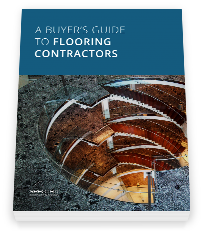Epoxy flooring systems explained
Epoxy flooring systems are a thermosetting resin often applied as a protective and decorative coating on concrete flooring. The strong and durable nature of the system makes it a desirable flooring option for many commercial and industrial applications, ranging from manufacturing facilities and hangars to kitchens and garages.
Top considerations for epoxy flooring system installation and maintenance
Although epoxy flooring systems are relatively easy—and cheap—to install, expertise and precision are key. Coatings that are applied improperly will chip and peel prematurely, while properly installed epoxy flooring systems should be low maintenance and highly resistant to chemical spills and abrasions. This is why it is imperative that you partner with the right commercial flooring contractor—they will be able to guide you from start to finish to ensure your flooring project goes smoothly.
Epoxy coatings are typically applied to concrete flooring to enhance resilience and aesthetic appeal. Prepping the substrate concrete is important, especially when the concrete isn’t freshly laid. An experienced floor contractor will evaluate the substrate for cracks and existing coatings. First, they will remove previously applied coatings and thoroughly clean the surface. Then, depending on the state of the concrete, they might patch cracks with urethane cement. Finally, they will begin the application of the epoxy flooring systems.
From there, maintenance is simple and straightforward. For day-to-day cleaning, vacuuming or sweeping is fine. In fact, it’s recommended that you only deep clean the surface every couple months—in between deep cleans, you can spot clean as needed. When you do deep clean, make sure to avoid soapy products, as they might leave a filmy sheen on your epoxy flooring. Instead, it’s suggested that you use diluted ammonia and hot water.
Overall, epoxy flooring systems should be relatively painless to install when performed by an experienced professional. And, because lifetime maintenance is so easy, epoxy flooring systems are an attractive flooring option for a variety of commercial and industrial applications.
Benefits of epoxy flooring systems
While ease of installation and maintenance are appealing, there are many other factors to consider before choosing the flooring for your next project. Different buildings and different layouts require different features. While a commercial flooring contractor will be best equipped to holistically evaluate your needs and guide you toward the right flooring type, here are several benefits of epoxy flooring systems:
- Enhanced aesthetic appeal
Good design welcomes patrons and employees and makes your space look finished and professional. Epoxy flooring systems offer a wide array of stain and color options. A popular design option is to use an epoxy system with colored microchips, and then top with a high-gloss finish. Metallic finishes are also available for those who really want to give a memorable design impression. - Smooth, resilient, surface
When properly installed and maintained, epoxy flooring systems are abrasion and chemical-resistant. For high-traffic industrial and commercial applications, such durability and strength is a must. - Low lifetime cost
While it’s important that a flooring contractor oversees the installation of your epoxy flooring system, the low maintenance needs of the flooring system will ensure that your flooring remains in working condition long into the future at little cost.
A flooring contractor will be able to point you toward the right flooring solution for you, based on application, design and lifetime value. To learn more about the benefits of partnering with an experienced commercial flooring contractor, download our Buyer’s Guide to Flooring Contractors by filling out the form below.

A buyer’s guide to commercial flooring
How to get the greatest-value floor and select the right contractor for your project.
